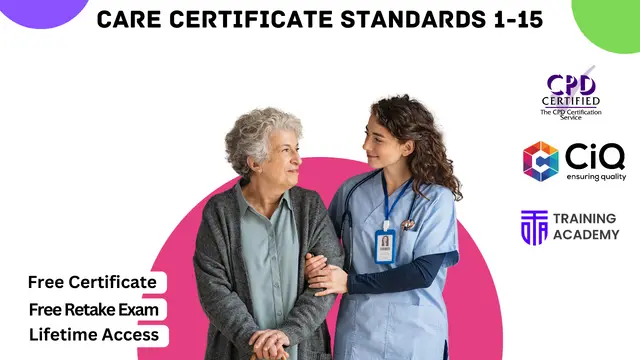
Care Certificate Standards 1-15: Mandatory Skills for Healthcare Professionals
CPD UK Accredited ! Free Certification | Covered 81 Topics | FREE Retake Exam | Lifetime Access | No Hidden Fees
Online Training Academy
Summary
- CPD Certified PDF Certificate - Free
- Reed Courses Certificate of Completion - Free
- Tutor is available to students
Add to basket or enquire
Overview
The Care Certificate constitutes a set of agreed-upon benchmarks outlining the expected knowledge, skills, and conduct for specific roles within the health and social care sectors. Comprising 15 essential standards designed for individuals "new to care," these care certificate standards should be integral to a comprehensive induction program.
Our Care Certificate course holds CPD UK accreditation, and we are recognised as an endorsed training provider by CIQ.
Included in the Care Certificate Preparation package are:
- All 15 Care Certificate Standards
- CPD-accredited online learning aligned with care frameworks
- Securely maintained online records of learner certificates, reporting, and CPD points
- EU Framework and UK Care Worker Standards Followed
It's worth noting that the Care Certificate can be pursued even if you are employed in a non-care role, such as a cook or maintenance personnel.
Key Features:
- CPD UK Certified Care Certificate Preparation Course
- Free Certificate from Reed
- CIQ Approved
- Developed by Care Certificate Specialist
- Lifetime Access
CPD
Curriculum
-
Section 01: Clarifying Your Role 45:00
-
Section 02: Personal Development Strategies 18:00
-
Section 03: Understanding Duty of Care 50:00
-
Section 04: Embracing Equality and Diversity 38:00
-
Section 05: Person-Centred Approach to Work 50:00
-
Section 06: Effective Communication Techniques 51:00
-
Section 07: Respecting Privacy and Upholding Dignity 38:00
-
Section 08: Management of Fluids and Nutrition 21:00
-
Section 09: Addressing Mental Health, Dementia, and Learning Disabilities 57:00
-
Section 10: Ensuring Safeguarding for Adults 57:00
-
Section 11: Ensuring Safeguarding for Children 10:00
-
Section 12: Basics of Life Support 11:00
-
Section 13: Health and Safety Protocols 1:15:00
-
Section 14: Responsible Handling of Information 25:00
-
Section 15: Implementing Infection Control Measures 19:00
-
CPD Certificate - Free 01:00
Course media
Description
Why this Care Certificate Preparation Course?
From this Care Certificate course, you will learn how to navigate the terrain of duty with a heightened sense of empathy, where the embrace of equality and diversity becomes second nature. Feel the pulse of person-centred care pulsating through your fingertips, as effective communication becomes the linchpin connecting hearts and minds.
Stand as a guardian of privacy and dignity, mastering the delicate dance of respect. From the management of fluids to the intricate web of mental health, dementia, and learning disabilities, you’ll find yourself equipped with insights that transcend the ordinary.
Course Curriculum
Care Certificate Standards
- Care Certificate Standard01: Clarifying Your Role
- Care Certificate Standard02: Personal Development Strategies
- Care Certificate Standard03: Understanding Duty of Care
- Care Certificate Standard04: Embracing Equality and Diversity
- Care Certificate Standard05: Person-Centred Approach to Work
- Care Certificate Standard06: Effective Communication Techniques
- Care Certificate Standard07: Respecting Privacy and Upholding Dignity
- Care Certificate Standard08: Management of Fluids and Nutrition
- Care Certificate Standard09: Addressing Mental Health, Dementia, and Learning Disabilities
- Care Certificate Standard10: Ensuring Safeguarding for Adults
- Care Certificate Standard11: Ensuring Safeguarding for Children
- Care Certificate Standard12: Basics of Life Support
- Care Certificate Standard13: Health and Safety Protocols
- Care Certificate Standard14: Responsible Handling of Information
- Care Certificate Standard15: Implementing Infection Control Measures
Learning Outcomes:
- Apply duty of care principles in role for enhanced professionalism and responsibility.
- Demonstrate person-centred approaches for improved client satisfaction and engagement.
- Employ effective communication strategies fostering collaborative and empathetic interactions with clients.
- Safeguard adults and children by implementing appropriate measures and protocols.
- Execute infection control practices ensuring a safe and hygienic work environment.
- Exhibit a comprehensive understanding of life support and health and safety.
Certification
After completing this Care Certificate Standards 1-15: Mandatory Skillsfor Healthcare Professionals course, you will get a free Certificate.
Please note: The CPD approved course is owned by E-Learning
Solutions Ltd and is distributed under license.
Who is this course for?
- Individuals entering the healthcare and social care sectors.
- Aspiring caregivers in residential homes or community care settings.
- Support workers aiming to enhance their foundational care skills.
- Prospective healthcare assistants in hospitals or clinics.
- Employees seeking compliance with Care Certificate Standards 1-15.
Requirements
This Care Certificate course requires no formal qualifications.
Career path
- Care Assistant in Residential Homes
- Support Worker in Community Care
- Healthcare Assistant in Hospitals
- Dementia Care Worker
- Mental Health Support Worker
- Child Protection Officer in Social Services
Questions and answers
Currently there are no Q&As for this course. Be the first to ask a question.
Certificates
CPD Certified PDF Certificate
Digital certificate - Included
Reed Courses Certificate of Completion
Digital certificate - Included
Will be downloadable when all lectures have been completed.
Reviews
Currently there are no reviews for this course. Be the first to leave a review.
Legal information
This course is advertised on reed.co.uk by the Course Provider, whose terms and conditions apply. Purchases are made directly from the Course Provider, and as such, content and materials are supplied by the Course Provider directly. Reed is acting as agent and not reseller in relation to this course. Reed's only responsibility is to facilitate your payment for the course. It is your responsibility to review and agree to the Course Provider's terms and conditions and satisfy yourself as to the suitability of the course you intend to purchase. Reed will not have any responsibility for the content of the course and/or associated materials.


